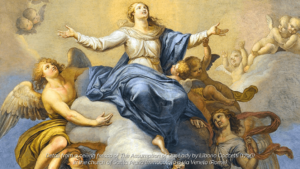“All generations will call me blessed.”

The Solemnity of the Assumption is one of the few feasts in the General Calendar of the Church that overrides a Sunday in Ordinary Time. As Sacrosanctum Concilium (“This Most Sacred Council,” the Constitution on the Liturgy of the Second Vatican Council) states, “Other celebrations, unless they be truly of greatest importance, shall not have precedence over the Sunday which is the foundation and kernel of the whole liturgical
year.” (#106) The Church looks at the Solemnity of the Assumption as being “truly of the greatest importance,” a position that is reinforced by the fact that it is still a Holy Day of Obligation.
Why is this Solemnity seen as so important? Obviously, because the Lady herself is seen as being so important! In the discussions that the bishops had at the Council, they considered issuing a separate document specifically on Mary. However, the consensus was that it would be more appropriate and probably get “more press” if a section on Mary was included in the most important document of the Council, Lumen Gentium (“Light to the Nations,” the Dogmatic Constitution on the Church). So the last chapter of this crucial document is dedicated to the Mother of God.
In it, the Church affirms, “The Catholic Church, taught by the Holy Spirit, honors her with filial affection and piety as a most beloved mother.” (#53) And to answer the critics who wrongfully assume that Catholic devotion to Mary somehow subverts or impedes the unique role of the Lord Jesus, the bishops also taught:
The maternal duty of Mary toward men in no wise obscures or diminishes this unique mediation of Christ, but rather shows His power. For all the salvific influence of the Blessed Virgin on men originates, not from some inner necessity, but from the divine pleasure. It flows forth from the superabundance of the merits of Christ, rests on His mediation, depends entirely on it and draws all its power from it. In no way does it impede, but rather does it foster the immediate union of the faithful with Christ. (#60)
All that the Lady does is meant to “foster the immediate union of the faithful with Christ,” that they would, as she instructs the servants at Cana, “do whatever He tells you.” It is also the Council’s intent that each of us “are moved to a filial love toward our mother and to the imitation of her virtues.” (#67).
Each of us is invited into a deeper relationship with Mary, even as the King of Kings gave her to us to be our Mother as He was dying on the Cross. This can take many different forms in our life, but the important thing is to respond to this invitation and continue to pursue a relationship with her. A useful prayer in this regard might be, “Lord Jesus, give me the relationship with Your Mother that You intend for me to have.” Typically, that would include the Rosary and the Brown Scapular, but these important devotions should only be part of our ongoing relationship with her.
We need to think of her as a person, one who loves us and watches over us and truly wishes to be “mother” to us. In the process of pursuing that, it can be helpful to consider different ways in which she has been presented, for example, in Gibson’s The Passion of the Christ or the series AD: The Bible Continues or especially The Chosen. Seeing her portrayed in those ways can facilitate our relating to her as an actual person; rather than viewing her simply as a “plaster saint.” Looking at her in such a minimalist way can truly rob us of the gift of deeper relationship with her that can be, as so many saints have taught over the years, a profound asset to our spiritual life.
Every gift of the King that we ignore makes our life here harder. As we celebrate her glorious entry in Heaven, let it stimulate our faith and our desire to come closer to our Mother in honor and love, even as the Lord Jesus Himself intends. – Fr. Ed Fride
Read More from Fr. Ed Fride
Third Sunday of Easter, 2022
“I will praise You, Lord, for You have rescued me.” The great Octave of Easter concluded with Divine Mercy Sunday, one of Pope St. John Paul the Great’s many gifts to the Church. During these last few weeks we have been graphically reminded of the gifts to us of the Eucharistic Lord, of the ... Read more

